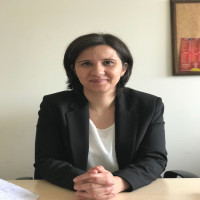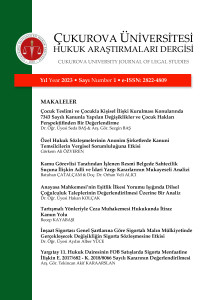Research Article
Aim & Scope
The journal aims to enhance the national and international literature in the field of law by publishing a wide range of interdisciplinary scientific studies. These studies encompass research articles, decision reviews, legislative reviews, book reviews, and translations, all associated with law and/or legal topics. The objective of CUHAD is to make valuable contributions to the field of law through its diverse publications.
The Çukurova University Journal of Legal Studies, abbreviated as "CUHAD," is a peer-reviewed electronic journal that releases two issues annually (June-December).
This journal offers the opportunity to publish scientific studies in law and/or interdisciplinary studies related to law and other foreign languages such as German, English, French, and more. The Editorial Board evaluates and approves the inclusion of these studies, ensuring their appropriateness for publication in the journal.
Author Guidelines
1) Manuscripts submitted to the journal must be original and should not have been previously published or under consideration for publication elsewhere.
2) The manuscript should adhere to British rather than American spelling, e.g., ‘recognise,’ not ‘recognize’; ‘labour,’ not ‘labor’; ‘analyse’ not ‘analyze.’ Place full points and commas inside quotation marks; place other punctuation marks outside quotation marks unless they are part of the quoted material. Footnote numbers should be placed outside quotation marks except when they are part of the exact quote. If there are any non-compliance issues, the Editorial Board may request the manuscript to be revised and resubmitted according to the relevant rules.
3) Once the manuscripts pass the initial evaluation by the Editorial Board, they will be forwarded to referees for review. Based on the referees’ reports, the decision will be made to accept the manuscript for publication, request revisions based on the reports, or reject the manuscript. The author will be promptly informed of the outcome. If revisions are requested, the author may only make changes within the framework of the specified corrections. The journal also includes translations, decision reviews, book reviews, legislative evaluations, and informative notes. The final decision to accept or reject a manuscript of this nature lies with the Editorial Board. If the articles are accepted for publication, Cukurova University Journal of Legal Studies holds all publication rights, including full-text publication in electronic format.
4) Only manuscripts submitted through the “Dergipark” system will be considered, and submissions sent via email to the journal’s contact address will not be reviewed.
5) Manuscript and Word Limits: The submitted work should include a title in both Turkish and foreign languages, abstracts of at least 100 and a maximum of 300 words in Turkish and foreign languages, and a minimum of three and a maximum of ten keywords in Turkish and foreign languages. The keywords should have the first letter capitalized.
6) Title and Author Name: The article title should be written in Times New Roman font, 12 points, with all letters capitalized, bolded, and centered. Below the title, the author’s full name should be provided. The author’s name, surname, academic title, institution, email address, and ORCID number should be listed as a footnote. The author’s name and surname should be written in size 12, bolded, and right-justified. The academic title, institution, email address, and ORCID number should be indicated sequentially with an asterisk (*) at the end. (Researchers without an ORCID number can obtain one from https://orcid.org/. Studies by researchers without an ORCID number will not be evaluated.)
Example: Assoc. Prof. Dr., Cukurova University Faculty of Law, Department of Civil Law, author@cu.edu.tr, ORCID: 0000-0000-0000-0000.
7) Page Layout: The page layout should have margins of 2.5 cm from the top, bottom, and sides.
8) Text: The main body of the study should contain a minimum of 4,500 words and a maximum of 15,000 words. The main heading of the article should be formatted as 'Heading 1'. Titles such as Abstract, Introduction, Conclusion, and Bibliography should be formatted as 'Heading 2'. Headings should be numbered using Roman numerals, starting with I. The first line of each heading should be indented by 1.25 cm.
a. Here is an example of the header structure:
MANUSCRIPT TITLE (English) (Heading 1)
ABSTRACT (English) (Heading 2)
MANUSCRIPT TITLE (Turkish) (Heading 1)
ABSTRACT (Turkish) (Heading 2)
INTRODUCTION (Heading 2)
I. HEADING 3
A. HEADING 4
1. Heading 5
a. Heading 6
I. Heading 7
AA. Heading 8
CONCLUSION (Heading 2)
REFERENCES (Heading 2)
A bibliography should be included at the end of the manuscript document, listing the sources used in alphabetical order based on the authors' surnames.
The main text of the study should be prepared in Times New Roman font, with a size of 12pt and 1.5 line spacing. Footnotes should be single-spaced with a font size of 10pt. The footnotes should hang 0.75 cm and have a 3.0 line spacing between them.
b. Citations should be presented in footnotes, following the "APA" citation system adopted for both footnotes and bibliographies. Examples of citations according to this system are provided below:
Book with one author:
In-text citation: (TANRIVER, p. 123)
Bibliography Citation: TANRIVER, S. (2021). Civil Procedure Law (4th ed., Vol. I). Ankara.
Book with two or more authors:
In-text citation: (ARSLAN, TANRIVER, p. 123)
In-text citation with multiple authors: (ARSLAN, YILMAZ, TASPINAR AYVAZ, HANAGASI, p. 123)
Bibliography Citation: ARSLAN, R., TANRIVER, S. (2001). Textbook of the Organization of the Judiciary (2nd ed.). Ankara.
Bibliography citation with multiple authors: ARSLAN, R., YILMAZ, E., TASPINAR AYVAZ, S., HANAGASI, E. (2018). Enforcement and Bankruptcy Law (4th ed.). Ankara.
Reference to more than one work by the same author:
In-text citation: (ALANGOYA, Arbitration, p. 123; ALANGOYA, Principles, p. 123)
Bibliography Citation: ALANGOYA, H. Y. (1973). The Nature and Supervision of Arbitration in Our Civil Procedure Law. Istanbul. (Arbitration).
Bibliography citation for another work by the same author: ALANGOYA, H. Y. (1979). Principles Regarding the Collection of Facts and Evidence in Civil Procedure Law. Istanbul. (Principles).
Book Chapter:
In-text citation: (AKKAN, p. 123)
Bibliography Citation: AKKAN, M. (2017). Pekcanıtez Procedural Civil Procedure Law (15th ed., Volume I). (H. PEKCANITEZ, M. OZEKES, H. TAŞ KORKMAZ, M. AKKAN, Organizers) Istanbul.
Article:
In-text citation: (ONEN, p. 568)
Bibliography Citation: ONEN, E. (1966). Authority in Real Estate Litigation. Ankara University Faculty of Law Journal, 22(1), 567-633.
Reference to Judgments:
References to decisions from the Court of Cassation and the District Court of Justice should follow the format presented in this section. While the Journal prescribes no specific procedure for citing foreign court decisions, a consistent format should be used throughout the article.
Example citation for a Court of Cassation decision: Y. 17. HD, T. 08.09.2020, M. 2019/3192, K. 2020/4927: Source from which the judicial decision was reached, (Accessed 12.12.2021).
Example citation for a District Court of Justice decision: Ankara BAM 2. HD, T. 23.01.2017, E. 2016/113, K. 2017/21: Source from which the judicial decision was reached, (Accessed 12.12.2021).
Ethical Principles and Publication Policy
1) Journal Publication Ethics
a) Çukurova University Journal of Legal Studies adheres to national and international academic principles and ethical values in its publication policy. The journal follows the principles outlined by The Council of Higher Education (YÖK) in the Scientific Research and Publication Ethics Directive, as well as the internationally recognized standards set by COPE (Committee on Publication Ethics), Directory of Open Access Journals (DOAJ), Open Access Scholarly Publishers Association (OASPA), and World Association of Medical Editors (WAME). The journal considers other national or international directives or standards on publication ethics valid as long as they do not contradict the aforementioned guidelines.
b) The journal rejects publication requests for works that are objectively determined to violate the relevant principles and standards at any stage of the publication evaluation process. If any published manuscript is found to be non-compliant with the regulations and standards, it will be removed from publication.
2) Obligations of the Editorial Board
a) Editors and assistant editors of the journal are obligated to fulfill their duties objectively and impartially, without any prejudice.
b) Editors and assistant editors of the journal are required to maintain strict confidentiality as necessary for their roles.
c) Editors and assistant editors of the journal collaborate fully in all aspects of the journal's work and transactions. Fair distribution of tasks within the journal is essential for effective cooperation.
3) Obligations of Authors and Referees
a) Authors submitting their works for publication in the journal must comply with the provisions of the Law on Intellectual and Artistic Works No. 5846, the principles set by YÖK in the Scientific Research and Publication Ethics Directive, the standards defined by COPE, and other principles and standards accepted by the journal.
b) Authors are assumed to have prepared their submitted manuscripts in accordance with the relevant provisions, principles, and standards for publication.
c) Referees carefully and promptly review the manuscripts assigned to them by the journal or its authorized units. They evaluate the manuscripts impartially and fairly based on their fields of expertise.
d) Referees are obligated to promptly notify the Editorial Board if they discover that the manuscripts they are evaluating are inconsistent with academic principles and ethical values or if they violate national or international regulations or standards.
Price Policy
Cukurova University fully covers all expenses associated with the journal. Authors are not required to pay any fees for the publication or processing of their articles. There are no charges for article submission or publication. When authors submit their work to our journal, they transfer their copyright and publication rights to Cukurova University.
Indexes
Journal Boards
OWNER
EDITOR

FIELD EDITORS

CO-EDITORS



FOREIGN LANGUAGE EDITORS


EDITORIAL BOARD






